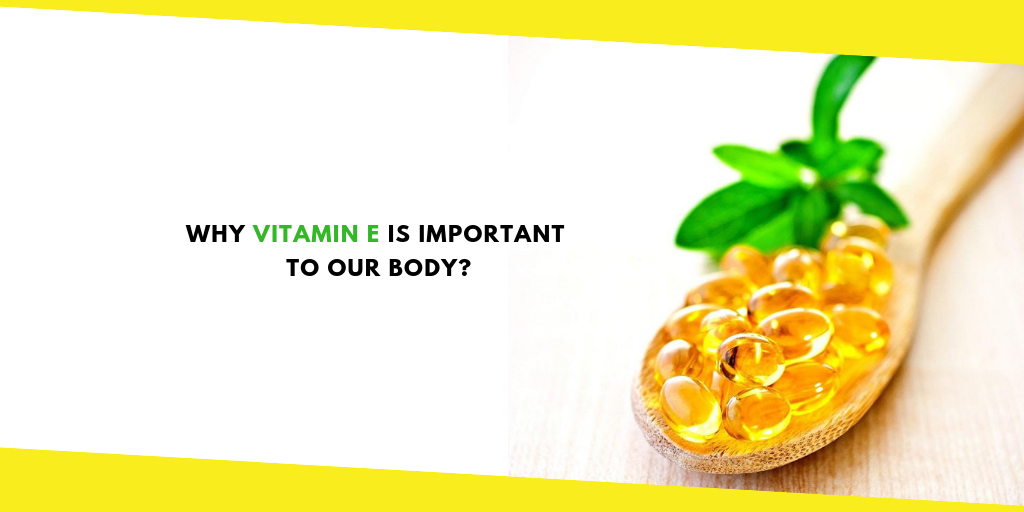Why Vitamin E Is Important To Our Body?
This post was last updated on December 13th, 2023

Vitamin E is one of the most important nutrients for the overall well being of the body. It is found in a wide range of foods and supplements. Although Vitamin E tablets and other supplements provide your body the much-required vitamin, it is always better to consume it in natural form through a healthy diet.
Since very rarely a person suffers from deficiency more often the issues of overdosing due to excess intake of supplements is a cause of concern. Also, individuals taking other medicines to treat certain health conditions must be cautious while consuming Vitamin E.
Vitamin E Deficiency And Its Symptoms
Deficiency of Vitamin E is very rare. But there are a few people who are more prone to such deficiency as compared to others. Infants or people with fat malabsorption and abetalipoproteinemia have more chances of having Vitamin E deficiency.
Some of the symptoms of Vitamin E deficiency include skeletal myopathy, anemia, retinopathy, peripheral neuropathy, nerve damage, and impairment of the immune response.
What Are The Sources Of Vitamin E?
The fat-soluble Vitamin E is present in sunflower seeds, green and leafy vegetables such as broccoli and spinach. When person consumers Vitamin-E enriched foods or supplements, the excess amount is not washed away with toxins. That is why; you need to take these doses under the guidance of a medical expert.
According to the U.S. National Library of Medicine (NLM), some of the good dietary sources of Vitamin E are peanuts, almonds, hazelnuts, and vegetable oils such as wheat germ, sunflower, safflower, corn, and soybean oils.
The registered dietitian and author of “The Essential Guide to Vitamins and Minerals,” Elizabeth Somer said, “It occurs naturally in eight different forms, including four tocopherols (alpha, beta, gamma and delta) and four tocotrienols. Alpha-tocopherol is the most common and most potent form of the vitamin.”
How Much Vitamin E Does A Body Needs?
The National Institutes of Health (NIH) says that the recommended Vitamin E dietary allowance (RDA) is 15 milligram for individuals above 14-years of age. However, nursing women require a little more of Vitamin E. The RDA for breastfeeding women is 19 mg. For adults doses below 1,000 mg are considered safe.
Infants of six months the Vitamin E RDA is 4 mg and for the children above six months and up to one year the RDA for Vitamin E is 5 mg. From 1 year onwards the requirement of Vitamin E keeps on increasing. Although there are lots of Vitamin E supplements available in the market, you should always talk to your physician first prior to starting them. It is also more important to ensure that you are not taking any medicines that interact with Vitamin E.
Types Of Vitamin E Supplements
Even if you have been diagnosed with a Vitamin E deficiency it is important to choose the right supplements. Checking the labels prior to purchasing is recommended. Currently, two types of Vitamin E supplements are available –natural and synthetic. The natural form is biologically a bit more active than the d-alpha-tocopherol form. That is why the required Vitamin E RDA for natural supplements is 22.4 IUs.
On the other hand, the synthetic Vitamin E RDA is 33.3 IUs.
What Are The Benefits Of Vitamin E?
Since it is a fat-soluble nutrient, the inclusion of Vitamin E in regular diet can offer multiple benefits. It mostly functions as an antioxidant thus protecting the cells from damage caused by free radicals, the unstable molecules. Most importantly, by protecting cell damage it lowers the risk for cancer and heart disease and most probably dementia.
1. Good For Skin
Skin being the largest organ of the body, caring for skin goes beyond just cleaning it with a good quality natural soap. Vitamin E contains a-tocopherol, the fat-soluble antioxidant in abundance and hence if Vitamin E in the body hits low levels it leads to poor skin quality. So, to maintain a good amount of a-tocopherol in the skin, you must take both topical and internal treatments. The topical treatment is readily absorbed by the topmost and subsequent layer of the body, epidermis, and dermis.
Vitamin E in the body prevents the skin from free radical damage as well as from UV damage. It contains anti-inflammatory compound preventing thickness, swelling, and edema in the skin. Vitamin E is also helpful in preventing chronic skin inflammation conditions such as hives. It maintains the smooth and elastic appearance of the skin. That is why Vitamin E supplements are recommended when due to aging or exposure to UV light skin starts sagging and getting wrinkles.
2. Improves Heart Health
Individuals under high oxidative stress can benefit from a-tocopherol. The compound protects the heart and is helpful particularly in diabetic patients or those who are on dialysis. When used alone without any combination with antioxidants, Vitamin E reduces heart attack risk.
3. Prevents Macular Degeneration
One study showed that when Vitamin E was taken together with Vitamin A, Vitamin C, and Zinc it prevents macular degeneration (AMD) caused due to aging by 25%. Other studies show that supplements containing a-tocopherol when taken in its natural form lower the 5-year risk for cataracts by around 60% for a period of 10 years and more.
Recommended: Use The Magic Vitamin E Capsules For A Glowing Skin
4. Improves Arthritis
Vitamin E reduces joint pain both during movement and at rest after taking a supplement of 400 IU for more than six weeks. Evidence also indicates that Vitamin is highly beneficial in treating lateral femoral condyle lesions.
5. Slows Down Decline In Immunity
Immune responses tend to decline as age progresses. Vitamin E supplements if regularly consumed by an elderly person can improve their body’s immune response, says a study conducted in between 1990-1997. Evidence states that diet high in Vitamin E improves cellular immunity thereby leading to higher differentiation in immature T cells through increased positive selection. It can thus help in speedy recovery from thymic atrophy after radiation treatment.
6. Serves As Antisterility Factor
A study performed by A. Sharaf and N.Gomaa revealed that Vitamin E consists of androgenic, estrogenic as well as progesterone-like properties and hence acts in synergy with both testosterone and hormones. Due to this, it is considered to be having an antisterility factor. An experiment tried on animals also proved that Vitamin E can improve fertility in male and female and protects fetuses and embryos from death.
You may like this
Recommended For You
Inpatient Rehab – 4 Key Reasons to Start Your Journey
Sangati Jogwar
Sangati is a writer, poet, voracious book reader, singer, movie-buff and critic. Loves to discuss, interact and have a strong belief in spirituality.




